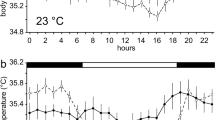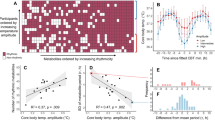Abstract
ONE of the most important characteristics of biological rhythms is their independence of temperature. Even the mammal may display a wide range of body temperatures, so that any hypothetical biochemical clock that it may possess may be ‘challenged’ to measure time at low temperatures. Some mammals have a wide range of body temperature both in a warm environment and while going into hibernation. Furthermore, with hypothermia as a procedure in human surgery, even human subjects undergo large changes in body temperature. Thus, measurements of rhythms in the cold mammal are of increasing interest. The following preliminary notes suggest the independence of temperature of a mammalian activity rhythm.
This is a preview of subscription content, access via your institution
Access options
Similar content being viewed by others
References
Folk, jun., G. E., Amer. Nat., xci, 153 (1957).
Lyman, C. P., and Chatfield, P. O., Physiol. Rev., 35, 403 (1955).
Dawe, A. R., and Morrison, P. R., Amer. Heart J., 49, 367 (1955).
Folk, jun., G. E., Proc. Fifth Conf. Biol. Rhythms, Stockholm (1955).
Author information
Authors and Affiliations
Rights and permissions
About this article
Cite this article
FOLK, G., MELTZER, M. & GRINDELAND, R. A Mammalian Activity Rhythm independent of Temperature. Nature 181, 1598 (1958). https://doi.org/10.1038/1811598a0
Issue date:
DOI: https://doi.org/10.1038/1811598a0



